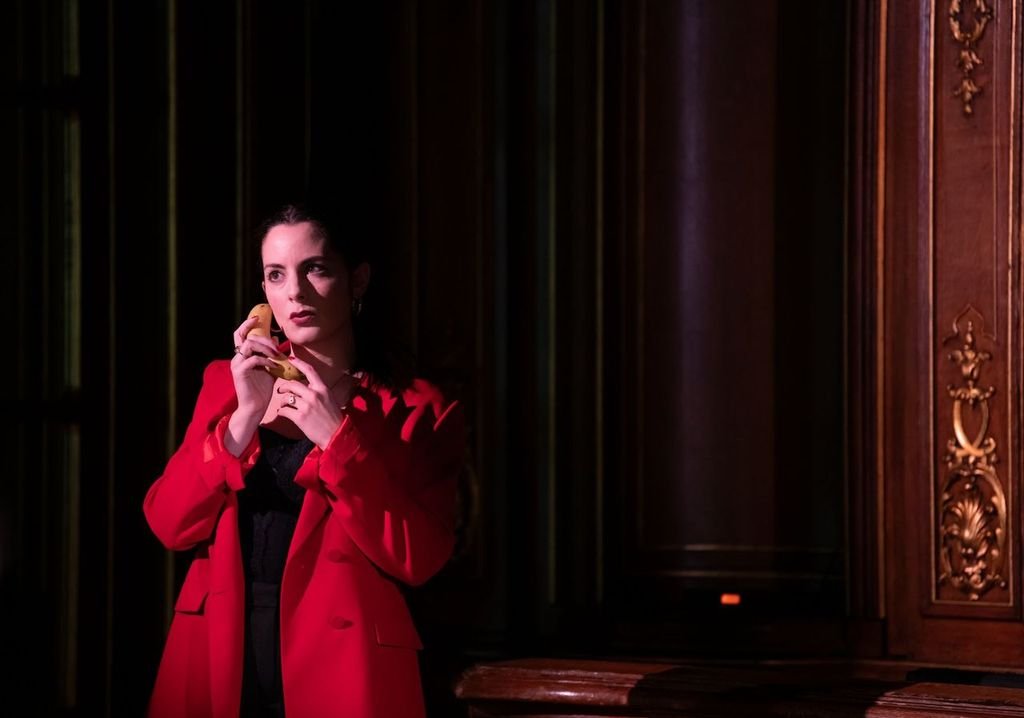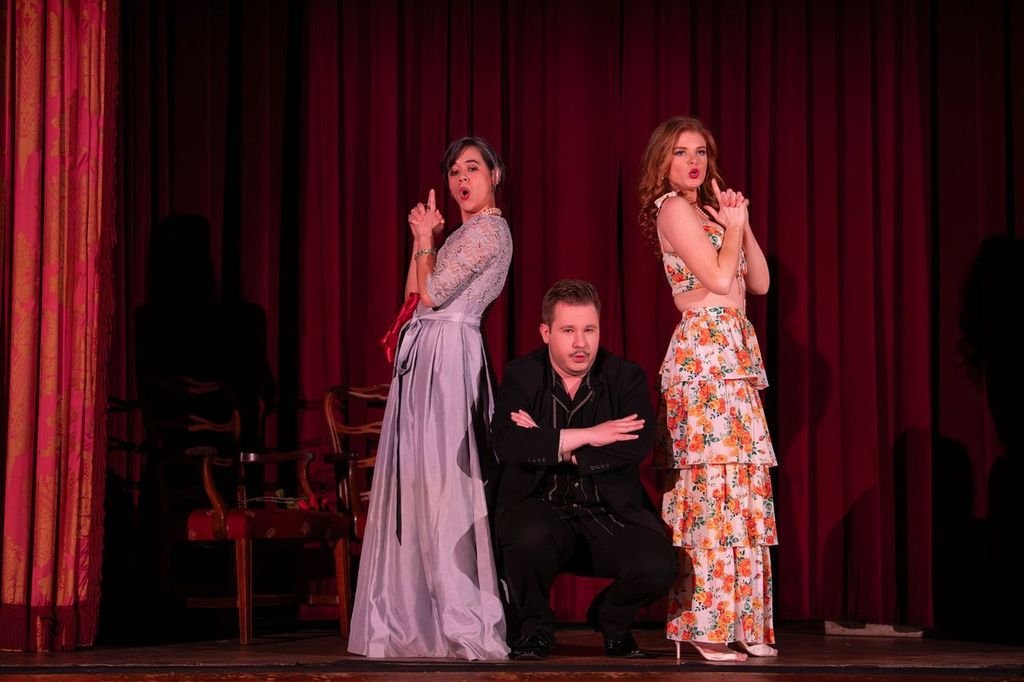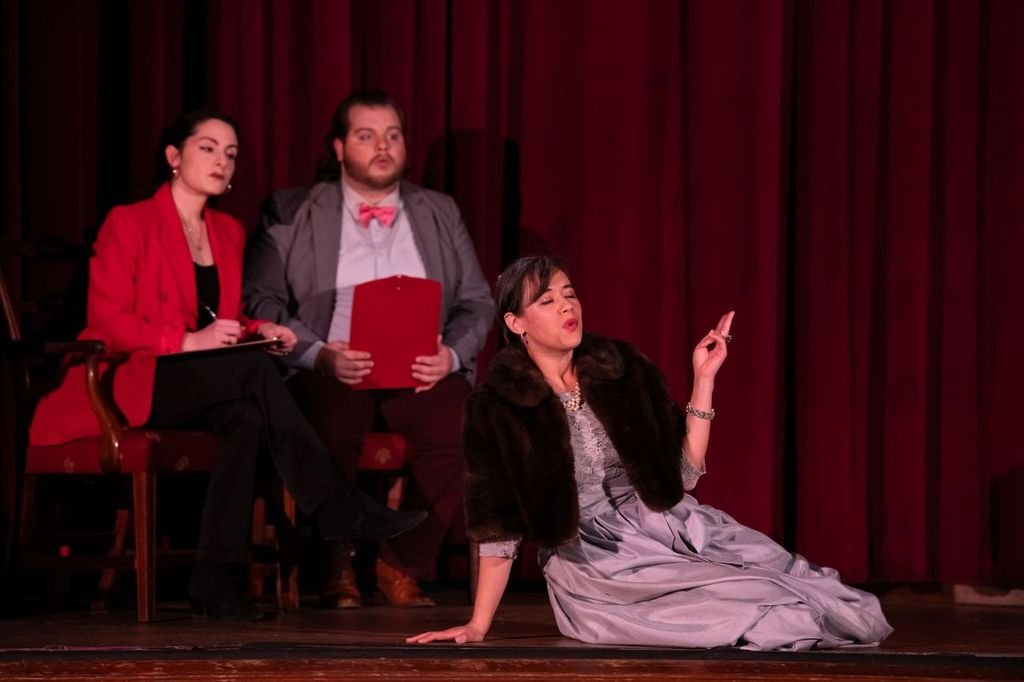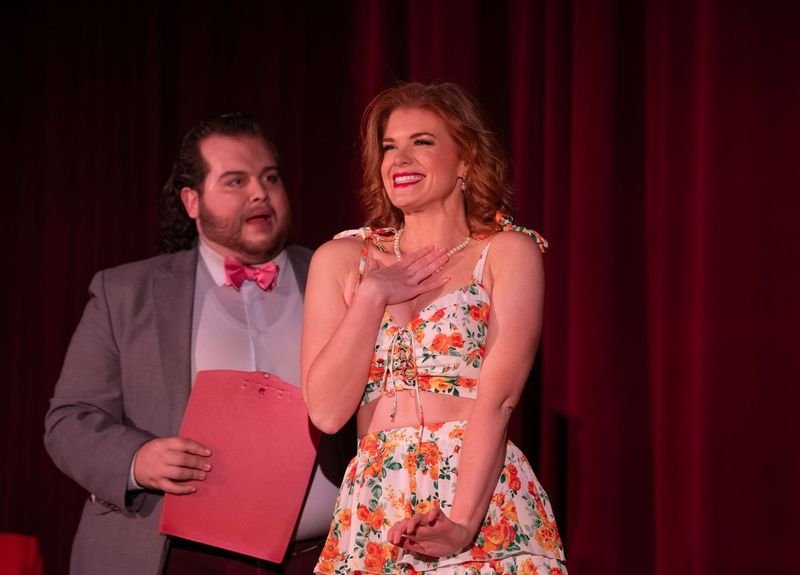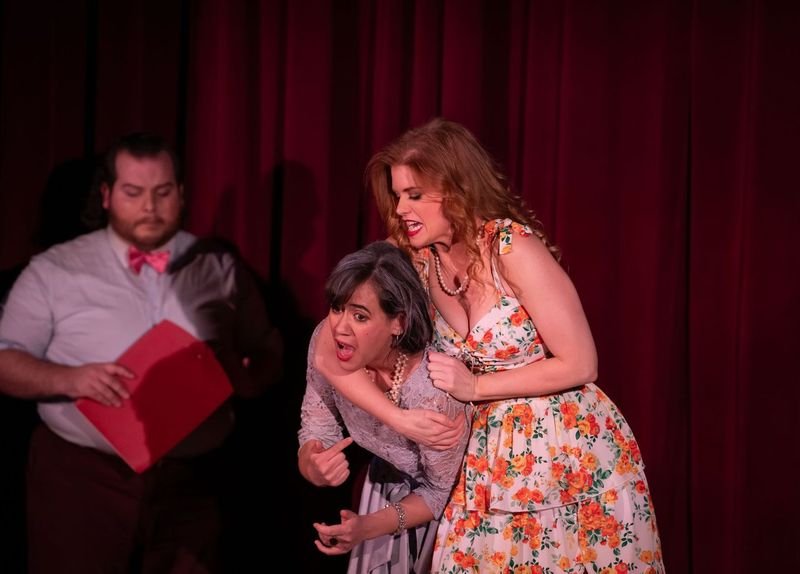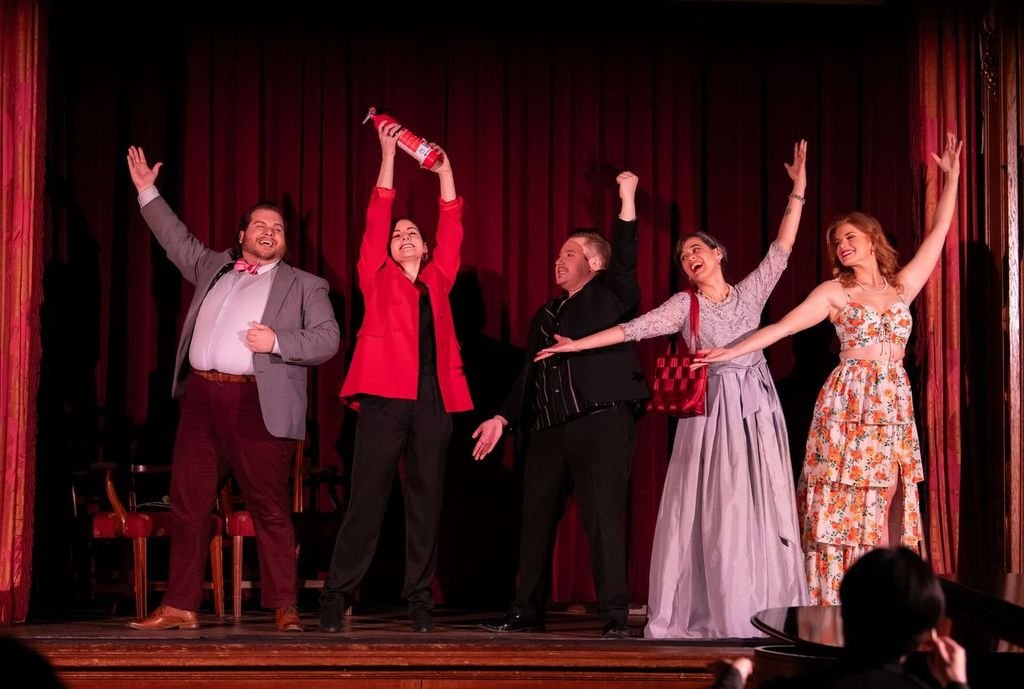For Opera Baltimore’s concluding opera of the season, the company chose to present Mozart’s The Impresario, creatively expanded and personalized, in celebration of the company’s 15th anniversary. In outline, Mozart’s work is a one-act German singspiel that tells the story, in comedic fashion, of a competition between rival sopranos for a role in an opera company. Artistic and General Director Julia Cooke had made the decision to involve and empower the singers she employed to help develop their roles and relationships. OB’s singers used the opera’s plotline to tell their characters’ stories, shaded by their experience and exaggerated for comedic effect, all illuminating the underlying challenges faced by opera companies. The Impresario was selected in part to add opera comedy to the line-up. The performances were intended to be spirited fun, enriching for both performers and patrons; and, in that they succeeded, but like with the best comedies, there were touching moments as well.
The impresario (Gina Perregrino) takes a phone call. Photo by Caitlin Moore Photography; courtesy of Opera Baltimore.
Mozart intended for The Impresario to be a bit of non-serious fun. In 1786, Emperor of the Austrian empire, Franz Josef, assigned both Antonio Salieri, the court opera director and the leading composer of the day, and Mozart, whom he also employed as a composer, the task of composing a musical work as entertainment for a family dinner. The emperor wished to demonstrate his commitment to support both Italian, Salieri’s task, and German opera, Mozart’s task (the Viennese largely spoke German). He had stages set up at opposite ends of a long palatial hallway with eighty invitees dining in the middle. Mozart’s German singspiel, The Impresario, less than an hour long with only 24 minutes of music, was performed first and was followed by Salieri’s Italian buffa opera. Reports of the experience favored Salieri’s comedic Italian opera as the winner, but history has selected Mozart’s German “play with music” which is still performed today, often by college opera companies. Mozart wrote an overture, two solo arias, and two ensemble numbers for the work. The original libretto by Johann Gottlieb Stephanie, especially the spoken dialog is often modified by opera companies to include additional humor that works today.
l to r: Madame Goldentrill (Robin Steitz), the agent Mr. Angel (Jason Garcia-Kakuk), and Mademoiselle Silverpeal (Emily Casey); the rivalry begins. Photo by Caitlin Moore Photography; courtesy of Opera Baltimore.
Opera Baltimore commissioned Eric McKeever, screen writer and performing baritone, who has previously worked with the company, to write a new libretto and script; Ms. Cooke brainstormed with him about stories and character presentations. The non-singing impresario in the original was named Frank. OB changed the name and the gender to Francine, a la Ms. Cooke, OB’s impresario, and Francine was given an aria and a duet (Ms. Cooke is a former singer). Additional operatic arias and comic elements were utilized lengthening the singspiel to around two hours. The script made fun of just about everything, including poking fun at the company’s name for being confused with previous area companies now out of business. Some of the arias were sung using original text and language and some were altered to English and modified to fit the story line and to work with Mozart’s music. An interesting aspect demonstrating Ms. Cooke’s emphasis on empowering the singers was that the two competing sopranos sang both the aria that Mozart assigned to each and were allowed to add an aria of their choice, picked to emphasize their talents, much as they would do when competing for roles in real life.
Madame Goldentrill (Robin Steitz) performs from the floor for the impresario (Gina Perregrino) and her assistant Herr Bluff (Henrique Cavalho). Photo by Caitlin Moore Photography; courtesy of Opera Baltimore.
The cast was made up of five excellent, accomplished young singers. Francine was played by mezzo-soprano Gina Perregrino, who had one aria adapted from Mozart’s La Clemenza di Tito and a soprano duet adapted from Le Nozze di Figaro. It was well done, and it was a treat to have a mezzo voice added to the mix. She had even more dialog and acted convincingly as Ms. Cooke…uh, I mean the beleaguered impresario in charge, serving as an anchor for the fictious company Opera Baltimore and for the performance overall. Her “not-so-good-at-assisting assistant” Herr Bluff was played by baritone Henrique Carvalho. His role was expanded to make him an aspiring singer, and he was given an aria adapted from Le Nozze di Figaro, which was performed with the enthusiasm and earnestness of an aspiring singer. Tenor Jason Garcia-Kakuk played a singing role as Angel, a “wily slick” agent, presenting the cases for both sopranos to the impresario and trying to subdue the war between them. He sang well in two trios with the sopranos, and his portrayal as a wise guy with a NYC accent was amusing. The two sopranos were both comedic delights both with acting and their vocal embellishments. Soprano Robin Steitz portrayed Madame Goldentrill, a former superstar coming out of rehab to try to re-establish her career, while acting as though her former status was still in place. Soprano Emily Casey played Mademoiselle Silverpeal, an aspiring young singer, gentle in persona, but ready to set the house on fire to defend her status and protect her career. I enjoyed the pair singing the arias Mozart wrote for each character sung in original form, but I especially enjoyed the arias each selected for themselves. Ms. Steitz sang a cabaret torch song, “Je ne t’aime pas” by Kurt Weil, with charming allure. Ms. Casey sang “Regnava nel silenzio” from Lucia di Lammermoor beautifully and added to the humor in dialog by affecting (I assume) a deep southern accent. Both were impressive with vocal fireworks as they sang higher and higher to impress the impresario in one trio with the agent joining to try to calm the two warriors, and eventually a trio where peace is made for the sake of art.
Herr Bluff (Henrique Carvalho) questions Mademoiselle Silverpeal (Emily Casey). Photo by Caitlin Moore Photography; courtesy of Opera Baltimore.
Impresarios know that something unexpected always happens. The nature of the work caused Ms. Cooke not to use covers, and unfortunately tenor Norman Shankle who was due to play the Agent suffered an injury the week before performances. She was able to get Mr. Garcia-Kabuk to fill in on short notice, causing one aria to be dropped due to limited practice. Nevertheless, Mr. Shankle, still committed to the production, participated in a seated, non-speaking role as the anonymous donor offering monetary support if Ms. Goldentrill was given the role.
Herr Bluff (Henrique Carvalho) looks on as the rivalry between Madame Goldentrill (Robin Steitz) and Mademoiselle Silverpeal (Emily Casey) gets physical. Photo by Caitlin Moore Photography; courtesy of Opera Baltimore.
Mozart’s music and arias in The Impresario are the quality we expect of Mozart, and the orchestrations are highly enjoyable. The modified libretto was designed to work well with Mozart’s music and was successful in that. I was curious how well piano accompaniment alone, as OB uses for their concert operas would work. Pianist Joy Schreier, who frequently works with Opera Baltimore, played beautifully as I have come to expect. I was immediately struck by how much I enjoyed hearing melodies and harmony from the overture played by piano alone. She, working with Conductor Joshua Hong did well with timing, which included what seemed to be spontaneous eruptions of songs from the singers and the pianist at several points, all for comedic effect.
l to r: Herr Bluff (Henrique Cavalho), the impresario (Gina Perregrino), Mr. Angel (Jason Garcia-Kabuk), Madame Goldentrill (Robin Steitz), and Mademoiselle Silverpeal (Emily Casey) celebrate peace for the sake of art.
This concert version was performed semi-staged in the regal ballroom of the Engineers Club with the stage at one end, reminiscent of its venue for the performance for the emperor. Semi-staged seemed almost full staged since the action takes place in a theater; the singers were in character with interacting and moving about the stage for comic effect. Director Claire Choquette did a masterful job keeping the action flowing and devising set ups for comic elements, particularly the ringside effects for the battle between the two sopranos. Much of the humor was slapstick, Chaplinesque in style. However, the transformations of the sopranos who discussed how they had come to sing opera were truly heart rending, as their motives for their behavior became clear. The final comments by Francine surely came directly from Ms. Cooke in emphasizing the singers’ involvement to seek fulfilment by becoming artists and their need for connection to the community they serve, and while challenging, it is worth it.
Bravo to Opera Baltimore for taking the risk of offering its audience something original, that deepened the understanding of all that they had shared over 15 years. I found it to be a humorous, heartwarming, and entertaining afternoon; I never once felt the urge to look at my iPhone. I was eager to see what was going to happen next.
The Fan Experience: The Impresario was performed in the Engineers Club on April 10, 12, and 14. The opera was performed in English with some arias performed in the original language; subtitles in English were shown. The performance with one intermission lasted close to 2.5 hours.
Dr. Aaron Ziegel, OB’s Scholar-in-Residence provides a pre-opera talk one hour before each performance. He also provides three or four one-hour, highly informative Zoom classes for ticket holders on each upcoming opera. This review was informed by his online lectures on The Impresario. These lectures are maintained and available online to all at this link.
Opera Baltimore will soon be announcing its new season for 2024-2025 and is offering a 16th Season Preview Party on June 4.
From a personal perspective, I hope the success the company is enjoying does not cause them to move completely away from the concert format. As I previously wrote, when first attending Baltimore Concert Opera performances, “The power of operatic voices is a thing to behold, especially engaged with them for an entire evening. It will surprise you when you encounter these voices up close for the first time. You’ve probably experienced the difference between hearing opera singers live in the major opera houses and hearing them on a recording and gotten a taste of the power and clarity of the live performance. Well, hearing them a few feet away takes that experience to yet another level.” It keeps me coming back.

